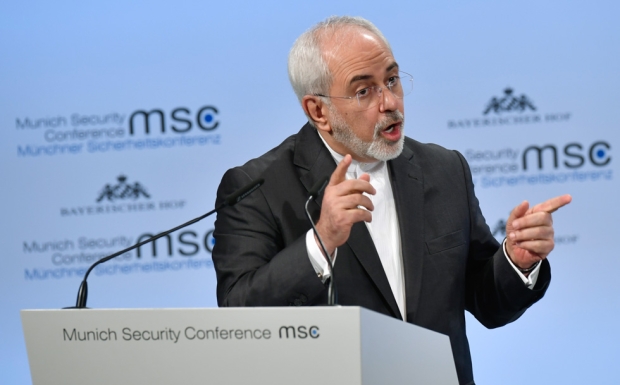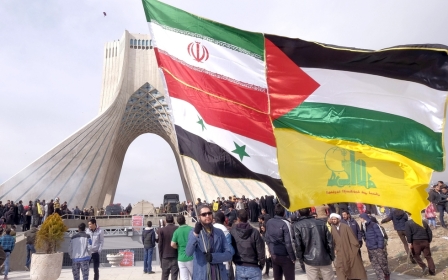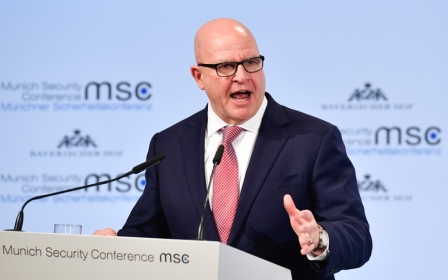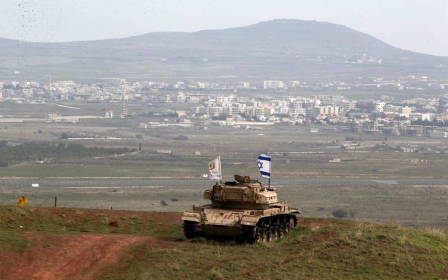'Cartoonish circus': Iran, Israel trade barbs as Netanyahu brandishes Iranian drone
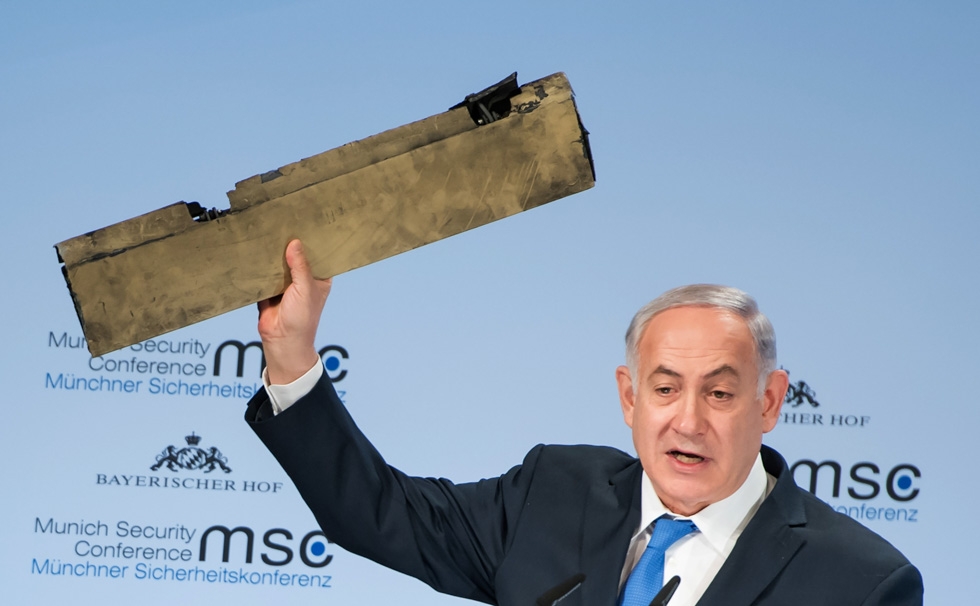
Israeli Prime Minister Benjamin Netanyahu traded barbs with Iranian Foreign Minister Mohammad Javad Zarif at a conference on Sunday, with Netanyahu saying Zarif "lies with eloquence".
Addressing the audience at the annual Munich Security Conference, Netanyahu said Zarif, who was due to speak after him, was the "smooth-talking mouthpiece of Iran's regime".
Tensions between the regional rivals mounted last week after Israel launched air raids against Iranian targets in Syria – the first known direct confrontation between the two nations' militaries.
An Israeli F-16 fighter jet was shot down by Syrian air defences during the raids. which came after Israel said it had downed an Iranian drone entering its territory from Syria. The pilots ejected over northern Israel.
Holding up what he said was a remnant of the downed drone during his speech, Netanyahu said: "Mr Zarif, do you recognise this? You should, it's yours. You can take back a message to the tyrants of Tehran: do not test Israel's resolve."
In response, Zarif slammed what he called Netanyahu’s "cartoonish circus," adding it "does not even deserve the dignity of a response".
Netanyahu reiterated his position that Iran was the greatest threat to world security, and referred to Iran’s allies in Yemen, Syria, Iraq, Lebanon and Gaza as a "noose of terror around our neck".
"We will act without hesitation to defend ourselves and we will act if necessary," he said, "not just against Iran's proxies that are attacking us but against Iran itself."
Iran has offered support to Shia militias in Iraq and Yemen, to Hamas in Gaza and to the Lebanese Hezbollah. Now, with the Syrian government of Bashar al-Assad gaining ground in its eight-year civil war with Iranian and Russian support, Israel fears Tehran will seek to build a permanent presence in its northern neighbour.
Netanyahu also called on world powers to scrap the 2015 Iran deal which eased economic sanctions on Iran in return for curbing its nuclear weapons programme.
"It's time to stop them now," Netanyahu said. "They're aggressive, they are developing ballistic missiles, they're not inspecting, they have a free highway to massive [uranium] enrichment."
European powers including Britain, France, Germany and Russia who were party to the accord have argued that Iran is complying with the agreement and are against tearing it up, something US President Donald Trump has said he favours.
Also speaking at the conference, Russian Senator Aleksey Pushkov and former US secretary of state John Kerry, who helped finalise the agreement, criticised moves to end the deal.
Kerry said it was "fundamentally not accurate" that Iran could obtain a nuclear weapon within the 15-year period when the deal ends.
"If your house is on fire, are you going to refuse to put it out because you are concerned it will light on fire again in 15 years? Or are you going to put it out and use the intervening time to prevent it ever catching fire again?" Kerry said.
Israel’s ‘so-called invincibility has crumbled’
During his address, Zarif said the downing of the Israeli jet last week shattered Israel's "so-called invincibility".
He also attacked Israel for using "aggression as a policy" and accused it of "mass reprisals against its neighbours and daily incursions into Syria, Lebanon".
"[Netanyahu’s] entire speech was trying to evade the issue," Zarif said. "What has happened in the past several days is the so-called invincibility of [Israel] has crumbled."
Zarif said the US was using the conference to "revive hysteria" against Iran. On Saturday, US National Security Advisor HR McMaster said Iran was arming a "network of proxies" that "is becoming more and more capable as Iran seeds more and more ... destructive weapons into these networks".
Zarif denied Israeli claims that Iran seeks to be a regional power, saying "we do not want to be the hegemon in the region ... we believe the era of hegemony has passed, regionally and globally.
"We have been on the right side of history – fighting Saddam [Hussein], fighting the Taliban, fighting Daesh, fighting al-Nusra," he said, referring to Islamic State using the Arabic acronym, Daesh. Jabhat al-Nusra is the former name of the Syrian rebel group previously linked to l-Qaeda.
"We propose creating a strong region rather than a strongman in the region."
Additional reporting by Reuters and AFP
New MEE newsletter: Jerusalem Dispatch
Sign up to get the latest insights and analysis on Israel-Palestine, alongside Turkey Unpacked and other MEE newsletters
Middle East Eye delivers independent and unrivalled coverage and analysis of the Middle East, North Africa and beyond. To learn more about republishing this content and the associated fees, please fill out this form. More about MEE can be found here.


